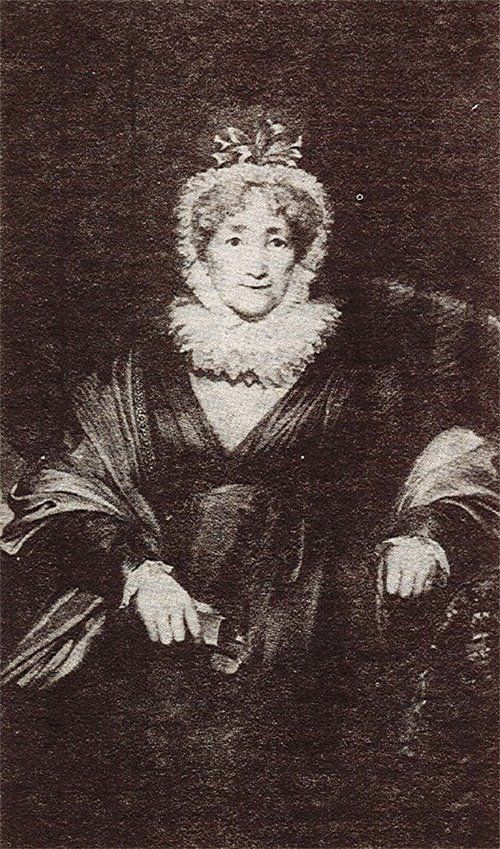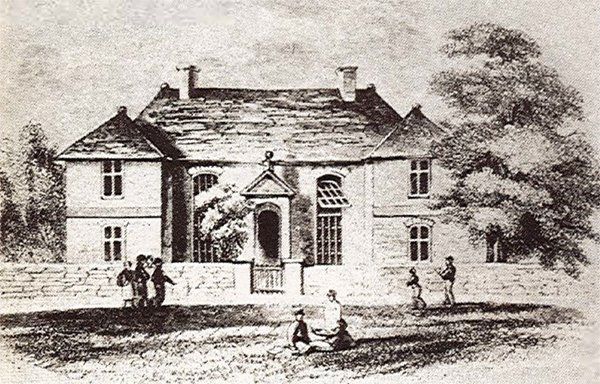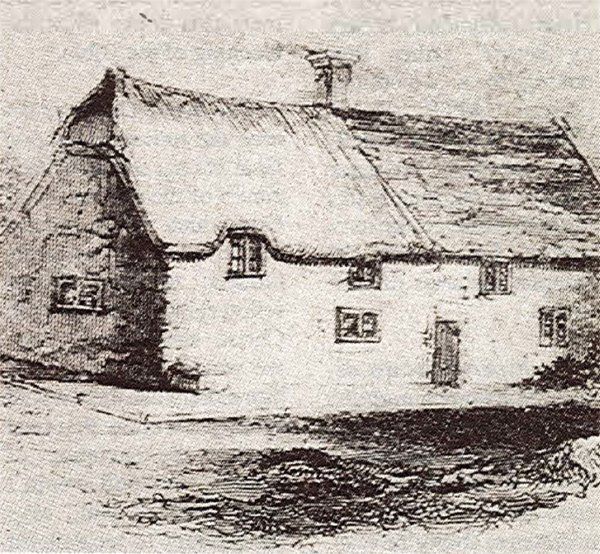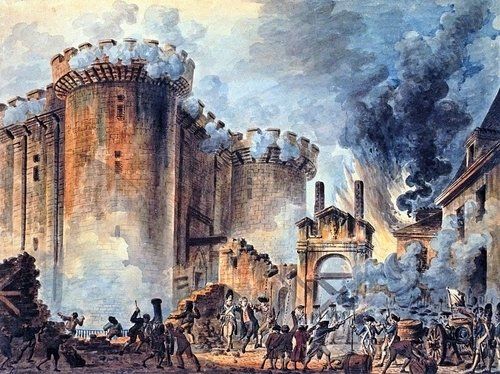
Covent Garden theatre was viewed by eighteenth-century evangelicals as the greatest corrupter of morals in the kingdom. Playwrights spent their lives dreaming of putting on plays there as the crown of their life’s work. One popular dramatist Hannah More, though very young, succeeded in having her plays run for weeks on end at Covent Garden, featuring famous actors such as David Garrick.
This blue-stockinged intellectual was regard as one of the greatest national luminaries of the theatre. Great was thus the astonishment when Hannah More suddenly announced that she had been changed by the gospel and was renouncing entertaining idle rich adults so that she might write edifying school books for children and bring the Bible to the poor of the Mendip Hills.
Miss More was born in Stapleton, Gloucestershire, on 2 February 1745, receiving her first education at home by her father, the headmaster of the local grammar school. She read fluently at four and soon mastered Latin. At eleven she entered her elder sisters’ school in Bristol, working hard at literature, French and Italian and developing a keen interest in drama. She became so proficient at writing that her plays, such as A search for happiness, were published and dramatized whilst she was still a schoolgirl.
Miss More was engaged early to a wealthy middle-aged man who kept postponing the marriage, so she broke off the engagement and worked out a settlement with him, receiving an endowment of £200 per annum. This left her an independent woman and she vowed never to marry.
At the age of twenty, Miss More put on plays at Bath, the centre of the haute volee, and by the time she was twenty-eight she had moved to the Metropolis and become firmly established as a playwright and poet. Her Covent Garden play Percy outrivalled Sheridan’s School for Scandal and drew crowds of ‘fashionable’ people. The four thousand printed copies of the play was sold out in a fortnight and edition followed edition.

At a time when even the best professional writers had difficulties making ends meet, Mistress More received over £30,000 for her plays and poems in a few years with apparently the greatest of ease. Only Goldsmith could rival, but not beat her in bargaining with publishers for a good fee. It was no wonder that Garrick, Samuel Johnson, Edmund Burke, Joshua Reynolds, Mrs. Montagu and Horace Walpob sought her company. Dr Johnson, the arch-critic, proclaimed that she was ‘the most powerful versificatrix in the English language’ and he was far from being alone in his estimate.
John Newton’s preaching
Miss More’s conversion came slowly. Garrick’s death in 1779 made her rethink her position as an entertainer. Bishop Beilby Porteus and John Newton turned her eyes to evangelical doctrines and she found deep instruction in Cowper’s verse. She finally came to a knowledge of salvation through Newton’s preaching.
Just as Cowper had received his initial impetus to write to God’s glory from Newton, the ex-slavemaster now showed Miss More how she could use her position in society to bring diving truths to people who would never dream of going to church. This resulted in her Sacred dramas of 1782 followed by Thoughts on the importance of the manners of the great to general society. When Cowper read this book which appeared anonymously, he thought its style and knowledge of upper-class society revealed Wilberforce as its author. Great was his surprise when he discovered that the work he had praised for its manly way of stating home truths was written by a woman.
Cowper had recommended Hannah More for her poem against slavery. Now he wrote to his favourite cousin Lady Hesketh saying: ‘If anything could have raised Miss More to a higher rank in my opinion than she possessed before it could only be your information that, after all, she and not Mr. Wilberforce is the author of that volume. How comes it to pass that she being a woman writes so little like one? With a force and energy and a correctness hitherto arrogated by the men, and not very frequently displayed even by men themselves.’
William Cowper’s poetry
Miss More was equally pleased with Cowper’s works, praising them for their ‘genuine Christianity’. At last she had found a poet she could recommend to her well-to-do friends for Sunday reading instead of Sterne, Swift, Congreve or worse. George Colman the playwright tells us that the reading of the rich was usually worse. Miss More, however, was determined to create a true Christian love for the Lord’s Day among her friends. She was thus shocked when wealthy evangelical patrons started to encourage ‘sacred’ Sunday concerts and oratorios in their churches to ‘liven up’ the worship. We read in her Memoirs the following words: ‘I have just received a card invitation from a countess, to a concert next Sunday, with a conditional postscript, “if I ever do such things on a Sunday”; and I have sent for answer, that I never do such a thing. After such a public testimony as I have given, one would have thought I should have escaped such an invitation.’
Hannah More’s tracts
Soon Hannah More’s Christian works were selling even better than her successful plays, running into an edition a week. Several editions were bought up within hours of leaving the printers and two books (Practical piety and Christian morals), written later in life, were sold out before they even left the printers! Various foreign translations were made, including Cingalese, the latter sponsored by the Chief Justice of Ceylon himself. Even books Miss More wrote in extreme old age, such as The spirit of prayer, proved best-sellers. Miss More was thus able to donate thousands of pounds to charity. Sunday card-playing and the gambling attached to it began to disappear from the wealthy’s homes.

Now Miss More turned her full attention to the poor, seeking to improve their lot socially and politically by presenting them with Christian virtues and aims and the gospel of salvation which alone could accomplish them. At first she did this by printing hundreds of thousands of tracts of her own composition. Next she started education work among poor women and founded two hundred schools, teaching children to read and write, with the Bible and her tracts as the main textbooks.
Protests from all walks of life poured in. She was told that her educated poor would soon be telling their ‘betters’ what to do. Wealthy farmers argued that the poor would always be ignorant and wicked.
Even the poor protested. Children at school meant less workers at home and in the fields and thus lower incomes for those already almost paupers. Parents thus demanded compensation from the educators. It was even rumoured that children were being educated to be sent as slaves to the colonies. Some clergy campaigned against the schools arguing that men would come home from a hard day’s work to find no dinner on the table but their wives curled up in easy chairs I reading The Lady’s magazine.
In the notorious Blagdon controversy the magistrate-curate, Mr. Bere, claimed that the schools were ‘seminaries of fanaticism, vice and sedition’ and that the pupils were taught to even pray for the French! He roused so much public anger that a number of schools had to be closed. Dissenters complained that Miss More was fostering anti-Dissenting sympathies as she equated Christianity with the monarchy and the Church of England.
Education for the poor
To combat this negative image, wherever Miss More placed a school, she provided work for the local craftspeople, combining Bible studies with instruction in household management, knitting and cookery. She even set up adult schools welcoming the men and old people. Mr. Bere’s bishop fought hard to be rid of his offensive curate and finally removed him from his post in 1802. Immediately the closed schools were reopened. Miss More began to work closer with leading Dissenters such as William Jay and appointed Dissenters on a number of her committees and boards.

At this time anti-French feeling was strong in the Establishment yet Thomas Paine’s revolutionary ideas were spreading swiftly in the country. There was enormous fear that England was on the brink of revolution. Critics maintained that teaching the lower classes to read was bringing Paine’s pamphlets into lower-class homes. Indeed, Paine’s The rights of man was no learned treatise but a clever, though shallow attempt to reach such homes with simply-put revolutionary ideas.
There was only one writer in England in the 1790s who could be sure of a gigantic readership and combat these revolutionary arguments in the same easily-understood, forceful language. This was Hannah More. Miss More quickly produced a tract which she named Village politics, teaching biblical norms for honest citizenship. It spoke to the heart of England and this work, followed by a number of others under the general heading Cheap repository tracts reached a sale of two million within twelve months.
For six years Miss More produced a regular supply of tracts, often on a weekly basis, which showed how God’s revealed design for the world was worlds better than that which Paine’s reason offered. When the Eclectic Society, founded by John Newton, met in February 1798 to discuss the subject ‘What can be done at the present moment to counteract the designs of infidels against Christianity?’ they recorded the following words: ‘Already had the powerful pen of Hannah More been most successfully employed in this important service, end her incomparable little tract Village politics by Will Chip had with astonishing rapidity, reached every corner of the kingdom; many hundred thousands were circulated in London alone; many thousands were sent by government to Scotland and Ireland; and men of the soundest judgement went so far as to affirm that it had been most essentially contributed, under providence, to prevent a revolution.’
A work that endured
A major result of Miss More’s action was that people began to flock to church. At Cheddar, for instance, there was an average congregation of eight in the morning and twenty in the afternoon. Ten years later, because of the intense work done by Miss More in the area, there was a regular attendance of eight hundred per service, mostly composed of the enlightened poor. When Miss More started her work, she only knew of one Christian nobleman. She was able to lead another twenty-nine peers and political leaders to cherish the crown of righteousness more than their earthly regalia Thus, though much has been written about such great men of the Awakening as Whitefield and Wesley, Miss More’s place in history as a great revival leader is just as secure and ought to be given more attention.
When Hannah More realized she was being relieved of her earthly duties and called home to God, she uttered just one word ‘joy’ and then died. One cannot help thinking that there was a touch of extra joy too in heaven when this ‘good and faithful servant’ was welcomed into glory.




